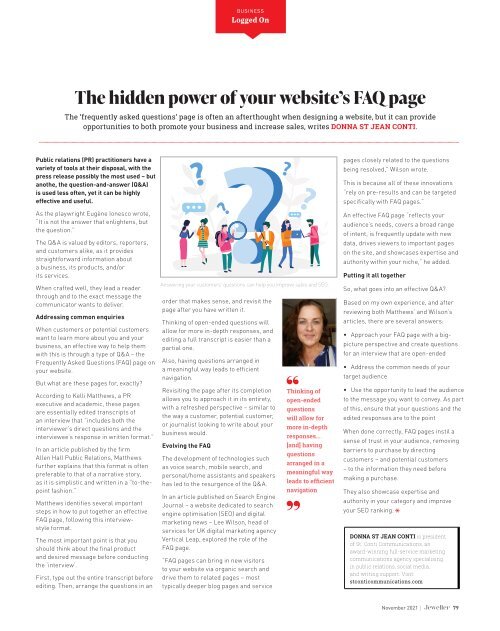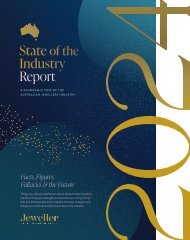You also want an ePaper? Increase the reach of your titles
YUMPU automatically turns print PDFs into web optimized ePapers that Google loves.
BUSINESS<br />
Logged On<br />
The hidden power of your website’s FAQ page<br />
The ‘frequently asked questions’ page is often an afterthought when designing a website, but it can provide<br />
opportunities to both promote your business and increase sales, writes DONNA ST JEAN CONTI.<br />
Public relations (PR) practitioners have a<br />
variety of tools at their disposal, with the<br />
press release possibly the most used – but<br />
anothe, the question-and-answer (Q&A)<br />
is used less often, yet it can be highly<br />
effective and useful.<br />
As the playwright Eugène Ionesco wrote,<br />
“It is not the answer that enlightens, but<br />
the question.”<br />
The Q&A is valued by editors, reporters,<br />
and customers alike, as it provides<br />
straightforward information about<br />
a business, its products, and/or<br />
its services.<br />
When crafted well, they lead a reader<br />
through and to the exact message the<br />
communicator wants to deliver.<br />
Addressing common enquiries<br />
When customers or potential customers<br />
want to learn more about you and your<br />
business, an effective way to help them<br />
with this is through a type of Q&A – the<br />
Frequently Asked Questions (FAQ) page on<br />
your website.<br />
But what are these pages for, exactly?<br />
According to Kelli Matthews, a PR<br />
executive and academic, these pages<br />
are essentially edited transcripts of<br />
an interview that “includes both the<br />
interviewer’s direct questions and the<br />
interviewee’s response in written format.”<br />
In an article published by the firm<br />
Allen Hall Public Relations, Matthews<br />
further explains that this format is often<br />
preferable to that of a narrative story,<br />
as it is simplistic and written in a “to-thepoint<br />
fashion.”<br />
Matthews identifies several important<br />
steps in how to put together an effective<br />
FAQ page, following this interviewstyle<br />
format.<br />
The most important point is that you<br />
should think about the final product<br />
and desired message before conducting<br />
the ‘interview’.<br />
First, type out the entire transcript before<br />
editing. Then, arrange the questions in an<br />
Answering your customers' questions can help you improve sales and SEO.<br />
order that makes sense, and revisit the<br />
page after you have written it.<br />
Thinking of open-ended questions will<br />
allow for more in-depth responses, and<br />
editing a full transcript is easier than a<br />
partial one.<br />
Also, having questions arranged in<br />
a meaningful way leads to efficient<br />
navigation.<br />
Revisiting the page after its completion<br />
allows you to approach it in its entirety,<br />
with a refreshed perspective – similar to<br />
the way a customer, potential customer,<br />
or journalist looking to write about your<br />
business would.<br />
Evolving the FAQ<br />
The development of technologies such<br />
as voice search, mobile search, and<br />
personal/home assistants and speakers<br />
has led to the resurgence of the Q&A.<br />
In an article published on Search Engine<br />
Journal – a website dedicated to search<br />
engine optimisation (SEO) and digital<br />
marketing news – Lee Wilson, head of<br />
services for UK digital marketing agency<br />
Vertical Leap, explored the role of the<br />
FAQ page.<br />
“FAQ pages can bring in new visitors<br />
to your website via organic search and<br />
drive them to related pages – most<br />
typically deeper blog pages and service<br />
Thinking of<br />
open-ended<br />
questions<br />
will allow for<br />
more in-depth<br />
responses...<br />
[and] having<br />
questions<br />
arranged in a<br />
meaningful way<br />
leads to efficient<br />
navigation<br />
pages closely related to the questions<br />
being resolved,” Wilson wrote.<br />
This is because all of these innovations<br />
“rely on pre-results and can be targeted<br />
specifically with FAQ pages.”<br />
An effective FAQ page “reflects your<br />
audience’s needs, covers a broad range<br />
of intent, is frequently update with new<br />
data, drives viewers to important pages<br />
on the site, and showcases expertise and<br />
authority within your niche,” he added.<br />
Putting it all together<br />
So, what goes into an effective Q&A?<br />
Based on my own experience, and after<br />
reviewing both Matthews’ and Wilson’s<br />
articles, there are several answers:<br />
• Approach your FAQ page with a bigpicture<br />
perspective and create questions<br />
for an interview that are open-ended<br />
• Address the common needs of your<br />
target audience<br />
• Use the opportunity to lead the audience<br />
to the message you want to convey. As part<br />
of this, ensure that your questions and the<br />
edited responses are to the point<br />
When done correctly, FAQ pages instil a<br />
sense of trust in your audience, removing<br />
barriers to purchase by directing<br />
customers – and potential customers<br />
– to the information they need before<br />
making a purchase.<br />
They also showcase expertise and<br />
authority in your category and improve<br />
your SEO ranking.<br />
DONNA ST JEAN CONTI is president<br />
of St. Conti Communications, an<br />
award-winning full-service marketing<br />
communications agency specialising<br />
in public relations, social media,<br />
and writing support. Visit:<br />
stconticommunications.com<br />
<strong>November</strong> <strong>2021</strong> | 79


















